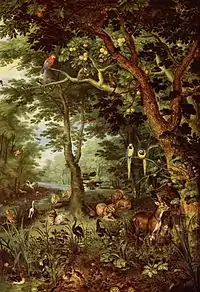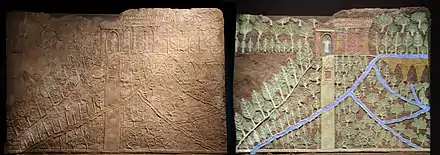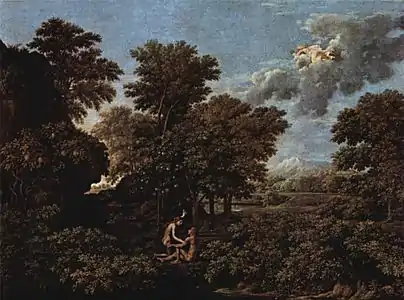Paradise
In religion, paradise is a place of exceptional happiness and delight.[1] Paradisiacal notions are often laden with pastoral imagery, and may be cosmogonical or eschatological or both, often compared to the miseries of human civilization: in paradise there is only peace, prosperity, and happiness. Paradise is a place of contentment, a land of luxury and fulfillment. Paradise is often described as a "higher place", the holiest place, in contrast to this world, or underworlds such as Hell.

In eschatological contexts, paradise is imagined as an abode of the virtuous dead. In Christian and Islamic understanding, Heaven is a paradisiacal relief. In old Egyptian beliefs, the otherworld is Aaru, the reed-fields of ideal hunting and fishing grounds where the dead lived after judgment. For the Celts, it was the Fortunate Isle of Mag Mell. For the classical Greeks, the Elysian fields was a paradisiacal land of plenty where the heroic and righteous dead hoped to spend eternity. The Vedic Indians held that the physical body was destroyed by fire but recreated and reunited in the Third Heaven in a state of bliss. In Buddhism, paradise and the heaven are synonymous, with higher levels available to beings who have achieved special attainments of virtue and meditation. In the Zoroastrian Avesta, the "Best Existence" and the "House of Song" are places of the righteous dead. On the other hand, in cosmogonical contexts 'paradise' describes the world before it was tainted by evil.
The concept is a theme in art and literature, particularly of the pre-Enlightenment era, a well-known representative of which is John Milton's Paradise Lost.
Etymology

The word "paradise" entered English from the French paradis, inherited from the Latin paradisus, from Greek parádeisos (παράδεισος), from an Old Iranian form, from Proto-Iranian*parādaiĵah- "walled enclosure", whence Old Persian 𐎱𐎼𐎭𐎹𐎭𐎠𐎶 p-r-d-y-d-a-m /paridaidam/, Avestan 𐬞𐬀𐬌𐬭𐬌⸱𐬛𐬀𐬉𐬰𐬀 pairi-daêza-. By the 6th/5th century BCE, the Old Iranian word had been borrowed into Assyrian pardesu "domain". It subsequently came to indicate the expansive walled gardens of the First Persian Empire, and was subsequently borrowed into Greek as παράδεισος parádeisos "park for animals" in the Anabasis of the early 4th century BCE Athenian Xenophon, Aramaic as pardaysa "royal park", and Hebrew as פַּרְדֵּס pardes, "orchard" (appearing thrice in the Tanakh; in the Song of Solomon (Song of Songs 4:13), Ecclesiastes (Ecclesiastes 2:5) and Nehemiah (Nehemiah 2:8)). In the Septuagint (3rd–1st centuries BCE), Greek παράδεισος parádeisos was used to translate both Hebrew פרדס pardes and Hebrew גן gan, "garden" (e.g. (Genesis 2:8, Ezekiel 28:13): it is from this usage that the use of "paradise" to refer to the Garden of Eden derives. The same usage also appears in Arabic and in the Quran as firdaws فردوس.
The word's etymology is ultimately derived from a PIE root *dheigʷ "to stick and set up". It is reflected in Avestan as 𐬞𐬀𐬌𐬭𐬌⸱𐬛𐬀𐬉𐬰𐬀 pairi-daêza-.[4][5] The literal meaning of this Eastern Old Iranian language word is "walled (enclosure)",[4] from pairi- 'around' (cognate with Greek περί, English peri- of identical meaning) and -diz "to make, form (a wall), build" (cognate with Greek τεῖχος 'wall').[6][7]
The idea of a walled enclosure was not preserved in most Iranian usage, and generally came to refer to a plantation or other cultivated area, not necessarily walled. For example, the Old Iranian word survives as Pardis in New Persian as well as its derivative pālīz (or "jālīz"), which denotes a vegetable patch.
Biblical
Hebrew Bible

The word pardes does not appear before the post-Exilic period (post-538 BCE); it occurs in the Song of Songs 4:13, Ecclesiastes 2:5, and Nehemiah 2:8, in each case meaning "park" or "garden", the original Persian meaning of the word, where it describes to the royal parks of Cyrus the Great by Xenophon in Anabasis.
Later in Second Temple era Judaism "paradise" came to be associated with the Garden of Eden and prophesies of restoration of Eden, and transferred to heaven. The Septuagint uses the word around 30 times, both of Eden, (Gen. 2:7 etc.) and of Eden restored (Ezek. 28:13, 36:35 etc.). In the Apocalypse of Moses, Adam and Eve are expelled from paradise (instead of Eden) after having been tricked by the serpent. Later after the death of Adam, the Archangel Michael carries the body of Adam to be buried in Paradise, which is in the Third Heaven.
New Testament
The New Testament use and understanding of paradise parallels that of contemporary Judaism. The word is used three times in the New Testament writings:
- Luke 23:43 – by Jesus on the cross, in response to the thief's request that Jesus remember him when he came into his kingdom.
- 2 Cor.12:4 – in Paul's description of a man's description of a third heaven paradise, which may in fact be a vision Paul himself saw.
- Rev.2:7 – in a reference to the Gen.2:8 paradise and the tree of life
Judaism
According to Jewish eschatology,[8][9] the higher Gan Eden is called the "Garden of Righteousness". It has been created since the beginning of the world, and will appear gloriously at the end of time. The righteous dwelling there will enjoy the sight of the heavenly chayot carrying the throne of God. Each of the righteous will walk with God, who will lead them in a dance. Its Jewish and non-Jewish inhabitants are "clothed with garments of light and eternal life, and eat of the tree of life" (Enoch 58,3) near to God and His anointed ones.[9] This Jewish rabbinical concept of a higher Gan Eden is opposed by the Hebrew terms gehinnom[10] and sheol, figurative names for the place of spiritual purification for the wicked dead in Judaism, a place envisioned as being at the greatest possible distance from heaven.[11]
Rabbinic Judaism
In modern Jewish eschatology it is believed that history will complete itself and the ultimate destination will be when all mankind returns to the Garden of Eden.[12]
In the Talmud and the Jewish Kabbalah,[13] the scholars agree that there are two types of spiritual places called "Garden in Eden". The first is rather terrestrial, of abundant fertility and luxuriant vegetation, known as the "lower Gan Eden". The second is envisioned as being celestial, the habitation of righteous, Jewish and non-Jewish, immortal souls, known as the "higher Gan Eden". The rabbis differentiate between Gan and Eden. Adam is said to have dwelt only in the Gan, whereas Eden is said never to be witnessed by any mortal eye.[13] In Rabbinic Judaism, the word 'Pardes' recurs, but less often in the Second Temple context of Eden or restored Eden. A well-known reference is in the Pardes story, where the word may allude to mystic philosophy.[14]
The Zohar gives the word a mystical interpretation, and associates it with the four kinds of Biblical exegesis: peshat (literal meaning), remez (allusion), derash (anagogical), and sod (mystic). The initial letters of those four words then form פַּרְדֵּס – p(a)rd(e)s, which was in turn felt to represent the fourfold interpretation of the Torah (in which sod – the mystical interpretation – ranks highest).
Christianity

_%D1%80%D0%B0%D0%B7%D0%B1%D0%BE%D1%98%D0%BD%D0%B8%D0%BA_%D1%83_%D1%80%D0%B0%D1%98%D1%83%252C_%D0%B6%D0%B8%D0%B2%D0%BE%D0%BF%D0%B8%D1%81_%D1%83_%D1%81%D0%B2%D0%B5%D1%82%D0%BE%D1%98_%D0%BE%D0%B1%D0%B8%D1%82%D0%B5%D1%99%D0%B8_%D0%93%D1%80%D0%B0%D1%87%D0%B0%D0%BD%D0%B8%D1%86%D0%B0%252C_%D0%A1%D1%80%D0%B1%D0%B8%D1%98%D0%B0.jpg.webp)
In the 2nd century AD, Irenaeus distinguished paradise from heaven. In Against Heresies, he wrote that only those deemed worthy would inherit a home in heaven, while others would enjoy paradise, and the rest live in the restored Jerusalem (which was mostly a ruin after the Jewish–Roman wars but was rebuilt beginning with Constantine the Great in the 4th century). Origen likewise distinguished paradise from heaven, describing paradise as the earthly "school" for souls of the righteous dead, preparing them for their ascent through the celestial spheres to heaven.[15]
Many early Christians identified Abraham's bosom with paradise, where the souls of the righteous go until the resurrection of the dead; others were inconsistent in their identification of paradise, such as St. Augustine, whose views varied.[16]
In Luke 23:43, Jesus has a conversation with one of those crucified with him, who asks, “Jesus, remember me when you come into your kingdom". Jesus answers him, “Truly I tell you, today you will be with me in paradise”.[17] This has often been interpreted to mean that on that same day the thief and Jesus would enter the intermediate resting place of the dead who were waiting for the Resurrection.[18] Divergent views on paradise, and when one enters it, may have been responsible for a punctuation difference in Luke; for example, the two early Syriac versions translate Luke 23:43 differently. The Curetonian Gospels read "Today I tell you that you will be with me in paradise", whereas the Sinaitic Palimpsest reads "I tell you, today you will be with me in paradise". Likewise the two earliest Greek codices with punctuation disagree: Codex Vaticanus has a pause mark (a single dot on the baseline) in the original ink equidistant between 'today' and the following word (with no later corrections and no dot before "today"[19]), whereas Codex Alexandrinus has the "today in paradise" reading. In addition, an adverb of time is never used in the nearly 100 other places in the Gospels where Jesus uses the phrase, "Truly I say to you".[20]
In Christian art, Fra Angelico's Last Judgement painting shows Paradise on its left side. There is a tree of life (and another tree) and a circle dance of liberated souls. In the middle is a hole. In Muslim art it similarly indicates the presence of the Prophet or divine beings. It visually says, "Those here cannot be depicted".
Jehovah's Witnesses
Jehovah's Witnesses believe, from their interpretation of the Book of Genesis, that God's original purpose was, and is, to have the earth filled with the offspring of Adam and Eve as caretakers of a global paradise. However, Adam and Eve rebelled against God's sovereignty and were banished from the Garden of Eden, driven out of paradise into toil and misery.
Jehovah's Witnesses believe that disobedient and wicked people will be destroyed by Christ at Armageddon and those obedient to Christ will live eternally in a restored earthly paradise. Joining the survivors will be the resurrected righteous and unrighteous people who died prior to Armageddon. The latter are brought back because they paid for their sins by their death and/or because they lacked opportunity to learn of Jehovah's requirements before dying. These will be judged on the basis of their post-resurrection obedience to instructions revealed in new "scrolls". They believe that resurrection of the dead to paradise earth is made possible by Christ's blood and the ransom sacrifice. This provision does not apply to those whom Christ as Judge deems to have sinned against God's holy spirit.[21][22]
One of Jesus' statements before he died were the words to a man hanging alongside him, "you will be with me in Paradise."[Luke 23:43] The New World Translation places a comma after the word 'today', dividing it into two separate phrases, "I tell you today" and "you will be with me in Paradise". This differs from standard translations of this verse as "I tell you today you will be with me in Paradise".[23] Based on scriptures such as Matthew 12:40, 27:63, Mark 8:31 and 9:31, Witnesses believe Jesus' expectation that he would be bodily resurrected after three days precluded his being in paradise on the same day that he died.[24]
Mormonism
In Latter Day Saint theology, paradise usually refers to the spirit world, the place where spirits dwell following death and awaiting the resurrection. In that context, "paradise" is the state of the righteous after death.[25] In contrast, the wicked and those who have not yet learned the gospel of Jesus Christ await the resurrection in spirit prison. After the universal resurrection, all persons will be assigned to a particular kingdom or degree of glory. This may also be termed "paradise".
Islam
In the Quran, Heaven is denoted as Jannah (garden), with the highest level being called Firdaus, i.e. Paradise. It is used instead of Heaven to describe the ultimate pleasurable place after death, accessible by those who pray, donate to charity, read the Quran, believe in: God, the angels, his revealed books, his prophets and messengers, the Day of Judgement and the afterlife, and follow God's will in their life. Heaven in Islam is used to describe skies in the literal sense and metaphorically to refer to the universe. In Islam, the bounties and beauty of Heaven are immense, so much so that they are beyond the abilities of mankind’s worldly mind to comprehend. There are eight doors of Jannah. These are eight grades of Jannah:
- 1. Jannah al-Mawa
- 2. Dar al-Maqam
- 3. Dar al-Salam
- 4. Dar al-Khuld
- 5. Jannah al-Adn
- 6. Jannah al-Na'im
- 7. Jannah al-Kasif
- 8. Jannah al-Firdaus
Jannah al-Mawa is in the lowest, Jannah al-Adn is the middle and Jannah al-Firdaus is the highest.
Imam Bukhari has also recorded the tradition in which the Prophet said,
'When you ask from Allah, ask Him for Al-Firdaus, for it is the middle of Paradise and it is the highest place and from it the rivers of Paradise flow.' (Bukhari, Ahmad, Baihaqi)
In this tradition, it is evident that Al-Firdaus is the highest place in Paradise, yet, it is stated that it is in the middle. While giving an explanation of this description of Al-Firdaus, the great scholar, Ibn Hibban states,
'Al-Firdaus being in the middle of Paradise means that with respect to the width and breadth of Paradise, Al-Firdaus is in the middle. And with respect to being 'the highest place in Paradise', it refers to it being on a height.'
This explanation is in agreement to the explanation which has been given by Abu Hurairah (r.a.) who said that
'Al Firdaus is a mountain in Paradise from which the rivers flow.' (Tafseer Al Qurtubi Vol. 12 pg. 100)
The Quran also gave a warning that not all Muslims or even the believers will assuredly be permitted to enter Jannah except those who had struggled in the name of God and tested from God's trials as faced by the messengers of God or ancient prophets:
Or do you think that you will enter Paradise while such [trial] has not yet come to you as came to those who passed on before you? They were touched by poverty and hardship and were shaken until [even their] messenger and those who believed with him said,"When is the help of Allah ?" Unquestionably, the help of Allah is near.
— Qur'an 2:214 (Al-Baqarah) (Saheeh International)
See also
References
- "Paradise | religion". Encyclopedia Britannica. Retrieved 2021-01-14.
- "Wall panel; relief British Museum". The British Museum.
- British Museum notice in 2018 temporary exhibit "I am Ashurbanipal king of the world, king of Assyria"
- New Oxford American Dictionary
- R. S. P. Beekes, Etymological Dictionary of Greek, Brill, 2009, p. 1151.
- "Online Etymology Dictionary". Archived from the original on 6 October 2014. Retrieved 2 October 2014.
- "An Etymological Dictionary of Astronomy and Astrophysics". Archived from the original on 2015-01-15. Retrieved 15 January 2015.
- Olam Ha-Ba – The Afterlife - JewFAQ.org; 02-22-2010.
- Eshatology – JewishEncyclopedia; 02-22-2010.
- "Gehinnom is the Hebrew name; Gehenna is Yiddish." Gehinnom – Judaism 101 websourced 02-10-2010.
- "Gan Eden and Gehinnom". Jewfaq.org. Retrieved 2011-06-30.
- "End of Days". End of Days. Aish. Retrieved 1 May 2012.
- Gan Eden – JewishEncyclopedia; 02-22-2010.
- "JewishEncyclopedia.com". Archived from the original on 13 October 2011. Retrieved 2 October 2014.
- Church fathers: De Principiis (Book II) Origen Archived 2008-07-20 at the Wayback Machine, newadvent.org
- Jean Delumeau (1995). History of paradise. University of Illinois Press. pp. 29–. ISBN 978-0-252-06880-5. Retrieved 3 April 2013.
- "Luke 23". Bible Gateway. Archived from the original on 19 July 2017. Retrieved 2 October 2014.
- A. W. Zwiep (1997). The Ascension of the Messiah in Lukan Christology /. BRILL. pp. 150–. ISBN 978-90-04-10897-4. Retrieved 3 April 2013.
- "The Significance of a Comma: An Analysis of Luke 23:43 - Ministry Magazine". Ministry Magazine. Archived from the original on 17 April 2017. Retrieved 8 May 2018.
- "For an Answer: Christian Apologetics - Luke 23:43". www.forananswer.org. Archived from the original on 18 April 2017. Retrieved 8 May 2018.
- What Does the Bible Really Teach? (Watchtower Bible & Tract Society, 2005), Chapter 7
- Insight on the Scriptures (Watchtower Bible & Tract Society, 1988), 783–92
- "Luke 23:43". Archived from the original on 3 October 2014. Retrieved 2 October 2014.
- "Meeting the Challenge of Bible Translation", The Watchtower, June 15, 1974, page 362–363
- Duane S. Crowther - Life Everlasting Chapter 5 - Paradise of the Wicked - Retrieved 8 July 2014.
External links
| Wikiquote has quotations related to: Paradise |
| Wikibooks has a book on the topic of: God and Religious Toleration/Paradise Meditation |
- Etymology of "paradise", Balashon.com
- Etymology OnLine, etymonline.com